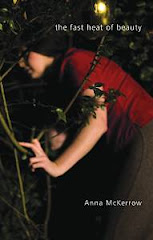I have been very quiet, haven’t I? But I have been very busy. Very busy indeed, yes. So to bring you up to date with what I’ve been doing, here’s something I’ve been reading: Sarah Hymas’ book of poems, Host. Now, immediately, the title makes me think about alien beings and diseases. Tapeworms, that kind of thing. Admittedly, I have a sci-fi imagination. I’m thinking about Sigourney Weaver playing scarily focused basketball right now. But the idea of a benign or perhaps unconscious structure being inhabited by another organism – and their relationship – is the focus of this multi-layered work. In Host, humans are the gentle or intrusive organisms swarming on the surface of the earth; but also not alien, not foreign: made of it.
The first part of the book, Bedrock, contains a narrative series of poems voiced by members of the Kibby family. Their relationship to their host, in this case the Yorkshire landscape, is explored sensitively by a writer whose appreciation of the nuances of energy in the natural and physical world is highly attuned:
A forget-me-not envelope scents the dark ward
Of a hospital, as honeysuckle stolen from Scarborough.
He writes in soft leaden whispers, long-limbed
Like the wind, sculpting in my mind. (Postmarked Today, 1927)
And
Driving alongside the Nidd, I saw myself
become two rivers, split to navigate the island
of my dead father: one sky-silvered quick,
the trained son; the other muddied with cross-currents.
His chest, rising with grass and rocks,
prevented me from seeing where the two might meet. (Nidderdale, 1934)
The family’s physicality has also absorbed the stone and wind of their environment:
Harold’s sweat speckled resin-bright on his forehead (Suffrage, 1910)
However, I have to say that my favourite part of the book is the second half of the second section, Landfall. Less narrative and not seemingly linked, these poems, for me, have the most intense relationship to nature and landscape. Inspired by extreme environments and preoccupied with air, rock, moss and water, these lovely meditations capture a sensual depth that is relatively unusual to find. And there is a real meditative, spiritual tone here too – holy men that, now and again, appear in the Himalayas, offer silent wisdoms, but it is really the silent ecstatic communion with the skies and the mountains that holds the greatest sense of revelation:
A musical score turned sculptural; filling
and falling through air, ventilating my vertebrae.
I breathe in octaves.
Out in minor chords.
With this dawn they magnify,
unfold like the wings of a griffin,
breasted with lotus petal chain-mail.
Trumpets echo up wicket-thin terraces.
Glaciers steal breath
faster than a knotted plastic bag.
The Himalya crevasse my ribcage,
let in light, scalpeled by this altitude,
as I was, yesterday on the walk here;
will be, tomorrow.
Packed salt in tired muscle,
they turn sharp then blunt in a distant wind.
Everything else, behind and below, melts away,
flesh from bone.
(From Pelling)
These poems do not just host or reside; they make a connection, a highway of energy between the physical, the limits of the body and the indefinable other. The thing I like most about this collection is the so-much-more-than landscape they offer: more, they are a being-in-ness, being-of-ness, that I very much enjoy.
Host is published by Waterloo Press. Sarah’s blog is http://sarahhymas.blogspot.com
Friday, 3 December 2010
Subscribe to:
Post Comments (Atom)






No comments:
Post a Comment